江苏省泰州中学2018届高三上学期开学考试英语试题+Word版含答案
江苏省南通市、泰州市2018届高三第一次模拟考试英语(含听力)试卷(含答案)
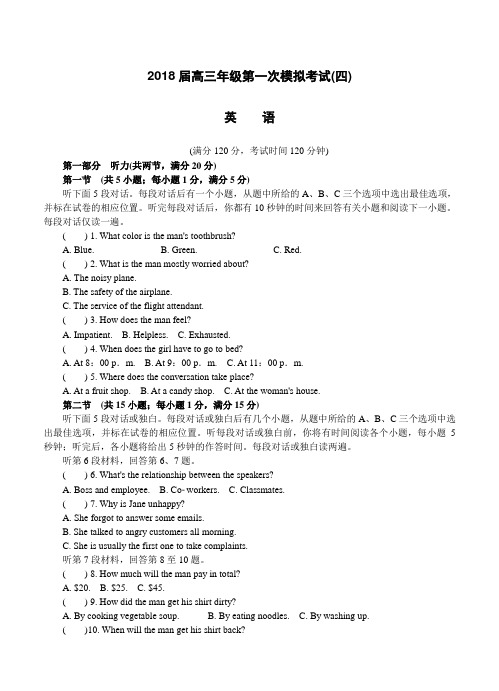
2018届高三年级第一次模拟考试(四)英语(满分120分,考试时间120分钟)第一部分听力(共两节,满分20分)第一节(共5小题;每小题1分,满分5分)听下面5段对话。
每段对话后有一个小题,从题中所给的A、B、C三个选项中选出最佳选项,并标在试卷的相应位置。
听完每段对话后,你都有10秒钟的时间来回答有关小题和阅读下一小题。
每段对话仅读一遍。
() 1. What color is the man's toothbrush?A. Blue.B. Green.C. Red.() 2. What is the man mostly worried about?A. The noisy plane.B. The safety of the airplane.C. The service of the flight attendant.() 3. How does the man feel?A. Impatient.B. Helpless.C. Exhausted.() 4. When does the girl have to go to bed?A. At 8:00 p.m.B. At 9:00 p.m.C. At 11:00 p.m.() 5. Where does the conversation take place?A. At a fruit shop.B. At a candy shop.C. At the woman's house.第二节(共15小题;每小题1分,满分15分)听下面5段对话或独白。
每段对话或独白后有几个小题,从题中所给的A、B、C三个选项中选出最佳选项,并标在试卷的相应位置。
听每段对话或独白前,你将有时间阅读各个小题,每小题5秒钟;听完后,各小题将给出5秒钟的作答时间。
每段对话或独白读两遍。
听第6段材料,回答第6、7题。
() 6. What's the relationship between the speakers?A. Boss and employee.B. Coworkers.C. Classmates.() 7. Why is Jane unhappy?A. She forgot to answer some emails.B. She talked to angry customers all morning.C. She is usually the first one to take complaints.听第7段材料,回答第8至10题。
江苏省泰州中学2018届高三第四次模拟测试英语试题Word版含答案

本卷分为第I卷(选择题)和第II卷(非选择题),满分120分,考试时间120分钟。
第一部分听力(共两节,满分30分)做题时,先将答案标在试卷上。
录音内容结束后,你将有两分钟的时间将试卷上的答案转涂到答题卡上。
第一节(共5小题;每小题1分,满分5分)听下面5段对话。
每段对话后有一个小题,从题中所给的A、B、C三个选项中选出最佳选项,并标在试卷的相应位置。
听完每段对话后,你都有10秒钟的时间来回答有关小题和阅读下一小题。
每段对话仅读一遍。
1. What does the woman think of the watch?A. It looks old.B. It is very accurate.C. It seems modern.2. How many pages will Sam write this weekend?A. Two.B. Three.C. Five.3. What are the speakers mainly talking about?A. Their hobbies.B. The man’s sic kness.C. A healthy lifestyle.4. Where is the speakers’ new house?A. One block from school.B. Five blocks from school.C. Across from the Welcome Store.5. Where does the conversation probably take place?A. At home.B. In a classroom.C. In a bookstore.听第6段材料,回答第6、7题。
6. What did the man buy for his mother?A. A necklace.B. A ring.C. A pair of earrings.7. What does the man say about the diamond?A. It is fake.B. It is purple.C. It isman-made.听第7段材料,回答第8、9题。
(完整word版)江苏省泰州中学2018届高三上学期期中考试英语试题(有答案)

(完整word版)江苏省泰州中学2018届⾼三上学期期中考试英语试题(有答案)第I卷(三部分共85分)第⼀部分:听⼒部分(共两节,满分20分)第⼀节(共5⼩题;每⼩题1分,满分5分)请听下⾯5段对话。
每段对话后有⼀个⼩题,从题中所给的A、B、C三个选项中选出最佳选项,并标在试卷的相应位置。
听完每段对话后,你都有10秒钟的时间来回答有关⼩题和阅读下⼀⼩题。
每段对话仅读⼀遍。
1. Which activity will the man lake part in?A. Playing in a band.B. Street dancing.C. Singing.2. What might the woman have?A. Beef.B. Lamb.C. Fish.3. When will the woman come tomorrow?A. At about 9:00 a.m.B. At about 11:00 a.m.C. At about 12:00 p.m.4. Why are few people calling to see the apartment?A. The price is high.B. It is far from the city center.C. Too many people live there.5. What are the speakers mainly talking about?A. Whales.B. The weather.C. A voyage.第⼆节(共15⼩题;每⼩题1分,满分15分)请听下⾯5段对话或独⽩。
每段对话或独⽩后有⼏个⼩题,从题中所给的A、B、C三个选项中选出最佳选项,并标在试卷的相应位置。
听每段对话或独⽩前,你将有时间阅读各个⼩题,每⼩题5秒钟;听完后每⼩题将给出5秒钟的作答时间。
每段对话或独⽩读两遍。
请听第6段材料,回答第6、7题。
【2018南通泰州一模word】江苏省南通市、泰州市2018届高三第一次模拟考试英语试题含答案
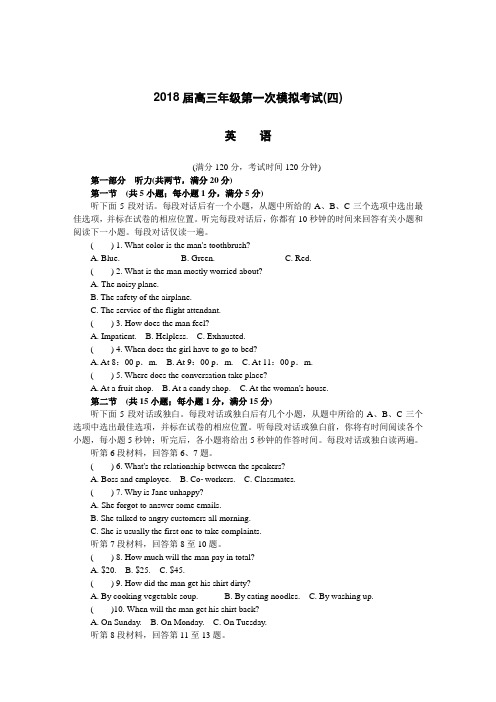
2018届高三年级第一次模拟考试(四)英语(满分120分,考试时间120分钟)第一部分听力(共两节,满分20分)第一节(共5小题;每小题1分,满分5分)听下面5段对话。
每段对话后有一个小题,从题中所给的A、B、C三个选项中选出最佳选项,并标在试卷的相应位置。
听完每段对话后,你都有10秒钟的时间来回答有关小题和阅读下一小题。
每段对话仅读一遍。
() 1. What color is the man's toothbrush?A. Blue.B. Green.C. Red.() 2. What is the man mostly worried about?A. The noisy plane.B. The safety of the airplane.C. The service of the flight attendant.() 3. How does the man feel?A. Impatient.B. Helpless.C. Exhausted.() 4. When does the girl have to go to bed?A. At 8:00 p.m.B. At 9:00 p.m.C. At 11:00 p.m.() 5. Where does the conversation take place?A. At a fruit shop.B. At a candy shop.C. At the woman's house.第二节(共15小题;每小题1分,满分15分)听下面5段对话或独白。
每段对话或独白后有几个小题,从题中所给的A、B、C三个选项中选出最佳选项,并标在试卷的相应位置。
听每段对话或独白前,你将有时间阅读各个小题,每小题5秒钟;听完后,各小题将给出5秒钟的作答时间。
每段对话或独白读两遍。
听第6段材料,回答第6、7题。
() 6. What's the relationship between the speakers?A. Boss and employee.B. Coworkers.C. Classmates.() 7. Why is Jane unhappy?A. She forgot to answer some emails.B. She talked to angry customers all morning.C. She is usually the first one to take complaints.听第7段材料,回答第8至10题。
江苏省泰州中学2018届高三上学期期中考试英语试题含答案

第I卷(三部分共85分)第一部分:听力部分(共两节,满分20分)第一节(共5小题;每小题1分,满分5分)请听下面5段对话。
每段对话后有一个小题,从题中所给的A、B、C三个选项中选出最佳选项,并标在试卷的相应位置.听完每段对话后,你都有10秒钟的时间来回答有关小题和阅读下一小题.每段对话仅读一遍.1. Which activity will the man lake part in?A. Playing in a band。
B. Street dancing. C。
Singing.2。
What might the woman have?A。
Beef. B. Lamb。
C. Fish.3。
When will the woman come tomorrow?A。
At about 9:00 a.m. B. At about 11:00 a.m。
C。
At about 12:00 p。
m。
4. Why are few people calling to see the apartment?A。
The price is high. B. It is far from the city center.C。
Too many people live there.5. What are the speakers mainly talking about?A. Whales.B. The weather。
C。
A voyage。
第二节(共15小题;每小题1分,满分15分)请听下面5段对话或独白。
每段对话或独白后有几个小题,从题中所给的A、B、C三个选项中选出最佳选项,并标在试卷的相应位置。
听每段对话或独白前,你将有时间阅读各个小题,每小题5秒钟;听完后每小题将给出5秒钟的作答时间。
每段对话或独白读两遍. 请听第6段材料,回答第6、7题。
6。
What is the man?A. A policeman.B. A salesman.C. A student。
2018年高考江苏省泰州中学上学期期中考试英语试题有答案
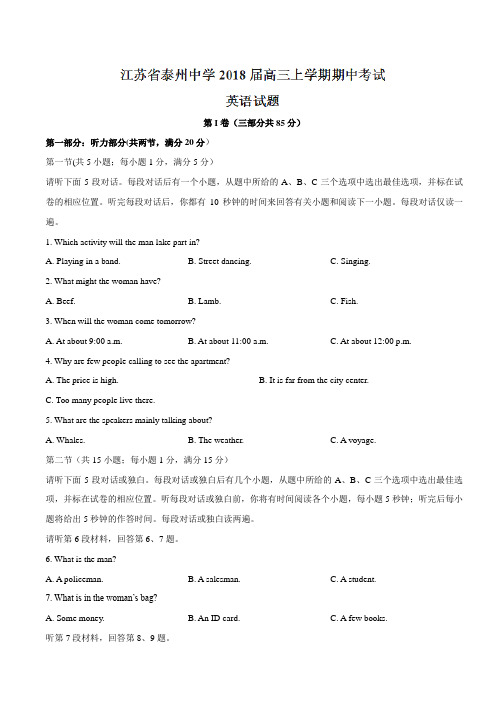
第I卷(三部分共85分)第一部分:听力部分(共两节,满分20分)第一节(共5小题;每小题1分,满分5分)请听下面5段对话。
每段对话后有一个小题,从题中所给的A、B、C三个选项中选出最佳选项,并标在试卷的相应位置。
听完每段对话后,你都有10秒钟的时间来回答有关小题和阅读下一小题。
每段对话仅读一遍。
1. Which activity will the man lake part in?A. Playing in a band.B. Street dancing.C. Singing.2. What might the woman have?A. Beef.B. Lamb.C. Fish.3. When will the woman come tomorrow?A. At about 9:00 a.m.B. At about 11:00 a.m.C. At about 12:00 p.m.4. Why are few people calling to see the apartment?A. The price is high.B. It is far from the city center.C. Too many people live there.5. What are the speakers mainly talking about?A. Whales.B. The weather.C. A voyage.第二节(共15小题;每小题1分,满分15分)请听下面5段对话或独白。
每段对话或独白后有几个小题,从题中所给的A、B、C三个选项中选出最佳选项,并标在试卷的相应位置。
听每段对话或独白前,你将有时间阅读各个小题,每小题5秒钟;听完后每小题将给出5秒钟的作答时间。
每段对话或独白读两遍。
请听第6段材料,回答第6、7题。
6. What is the man?A. A policeman.B. A salesman.C. A student.7. What is in the woman’s bag?A. Some money.B. An ID card.C. A few books.听第7段材料,回答第8、9题。
2018年江苏省泰州中学高考第一次模拟考试英语试题
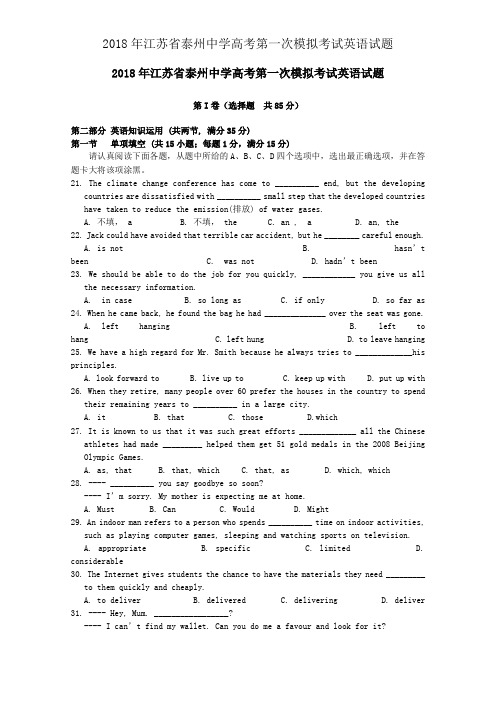
2018年江苏省泰州中学高考第一次模拟考试英语试题第I卷(选择题共85分)第二部分英语知识运用 (共两节, 满分35分)第一节单项填空 (共15小题;每题1分,满分15分)请认真阅读下面各题,从题中所给的A、B、C、D四个选项中,选出最正确选项,并在答题卡大将该项涂黑。
21. The climate change conference has come to __________ end, but the developingcountries are dissatisfied with __________ small step that the developed countrieshave taken to reduce the emission(排放) of water gases.A. 不填, aB. 不填, theC. an , aD. an, the22. Jack could have avoided that terrible car accident, but he ________ careful enough.A. is notB. hasn’tbeen C. was not D. hadn’t been23. We should be able to do the job for you quickly, ____________ you give us allthe necessary information.A. in caseB. so long asC. if onlyD. so far as24. When he came back, he found the bag he had ______________ over the seat was gone.A. left hangingB. left tohang C. left hung D. to leave hanging25. We have a high regard for Mr. Smith because he always tries to _____________his principles.A. look forward toB. live up toC. keep up withD. put up with26. When they retire, many people over 60 prefer the houses in the country to spendtheir remaining years to __________ in a large city.A. itB. thatC. thoseD.which27. It is known to us that it was such great efforts _____________ all the Chineseathletes had made _________ helped them get 51 gold medals in the 2008 BeijingOlympic Games.A. as, thatB. that, whichC. that, asD. which, which28. ---- __________ you say goodbye so soon?---- I’m sorry. My mother is expecting me at home.A. MustB. CanC. WouldD. Might29. An indoor man refers to a person who spends __________ time on indoor activities,such as playing computer games, sleeping and watching sports on television.A. appropriateB. specificC. limitedD. considerable30. The Internet gives students the chance to have the materials they need _________to them quickly and cheaply.A. to deliverB. deliveredC. deliveringD. deliver31. ---- Hey, Mum. _________________?---- I can’t find my wallet. Can you do me a favour and look for it?A. What’s onB. So whatC. Now thatD. What’s up32. The employers often give the job to __________ they believe have work experiencewith a strong sense of duty.A. whoeverB. those whoC. whoD. whomever33. ---- How could I thank you enough?----Don’t mention it. Any other man ________ that.A .would B. will do C. would have done D. had done34. ---- Would you like to go travelling with me to New York, Benjamin?---- Sorry, I’m busy, for the final examination is coming. So I ____________ hard throughout the next several weeks.A. have workedB. have been workingC. workD. will be working35. As the saying goes, _________. So take it easy and read the question slowly withinthen given time when you take the test.A. truth is the daughter of time.B. no man is wise at all time.C. easier said than done.D. more haste, less speed.第二节完型填空(共20小题;每题1分,满分20分)阅读下面短文,从21---40各题所给的四个选项(A、B、C和D)中,选出最正确选项, 并在答题卡大将该选项标号涂黑。
江苏省泰州中学2018届高三英语

本卷分为第I 卷 ( 选择题 ) 和第 I 卷 ( 非选择题 ) ,满分 120 分。
考试时间120 分钟。
第一部分听力 ( 共两节,满分30 分 )做题时,先将答案标在试卷上。
录音内容结束后,你将有两分钟的时间将试卷上的答案转涂到答题卡上。
第一节 (共 5小题; 每题 1分,满分 5分)听下边 5段对话。
每段对话后有一个小题,从题中所给的A、 B、 C 三个选项中选出最佳选项,并标在试卷的相应地点。
听完每段对话后,你都有10 秒钟的时间往返答相关小题和阅读下一小题。
每段对话仅读一遍。
l. Who will make a presentation this afternoon?A. Lily.B. Michael.C. Sophia.2. Where does the conversation probably take place?A. In a concert hall.B. In a restaurant.C. In a store.3. What does the man think of his work?A. Boring.B. Rewarding.C. Demanding.4. What are the speakers talking about?A. A French exam.B. An interpreter course.C.A job opportunity.5. What did the woman forget in her shopping list?A. Potatoes.B. Carrots.C. Onions.第二节 (共 15小题; 每题 1分,满分 15 分)听下边 5段对话或独白。
每段对话或独白后有几个小题,从题中所给的A、 B、C 三个选项中选出最正确选项,并标在试卷的相应地点。
听每段对话或独白前,你将有时间阅读各个小题,每题 5 秒钟 ;听完后,各小题将给出 5秒钟的作答时间。
江苏省泰州中学2018届高三12月月考英语试题 Word版含解析
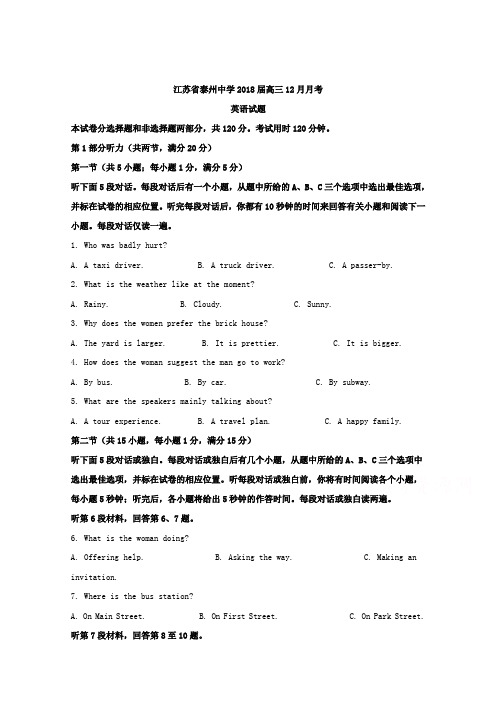
江苏省泰州中学2018届高三12月月考英语试题本试卷分选择题和非选择题两部分,共120分。
考试用时120分钟。
第1部分听力(共两节,满分20分)第一节(共5小题;每小题1分,满分5分)听下面5段对话。
每段对话后有一个小题,从题中所给的A、B、C三个选项中选出最佳选项,并标在试卷的相应位置。
听完每段对话后,你都有10秒钟的时间来回答有关小题和阅读下一小题。
每段对话仅读一遍。
1. Who was badly hurt?A. A taxi driver.B. A truck driver.C. A passer-by.2. What is the weather like at the moment?A. Rainy.B. Cloudy.C. Sunny.3. Why does the women prefer the brick house?A. The yard is larger.B. It is prettier.C. It is bigger.4. How does the woman suggest the man go to work?A. By bus.B. By car.C. By subway.5. What are the speakers mainly talking about?A. A tour experience.B. A travel plan.C. A happy family.第二节(共15小题,每小题1分,满分15分)听下面5段对话或独白。
每段对话或独白后有几个小题,从题中所给的A、B、C三个选项中选出最佳选项,并标在试卷的相应位置。
听每段对话或独白前,你将有时间阅读各个小题,每小题5秒钟;听完后,各小题将给出5秒钟的作答时间。
每段对话或独白读两遍。
听第6段材料,回答第6、7题。
6. What is the woman doing?A. Offering help.B. Asking the way.C. Making an invitation.7. Where is the bus station?A. On Main Street.B. On First Street.C. On Park Street. 听第7段材料,回答第8至10题。
江苏省泰州中学2018届高三上学期开学考试英语试题(有答案)
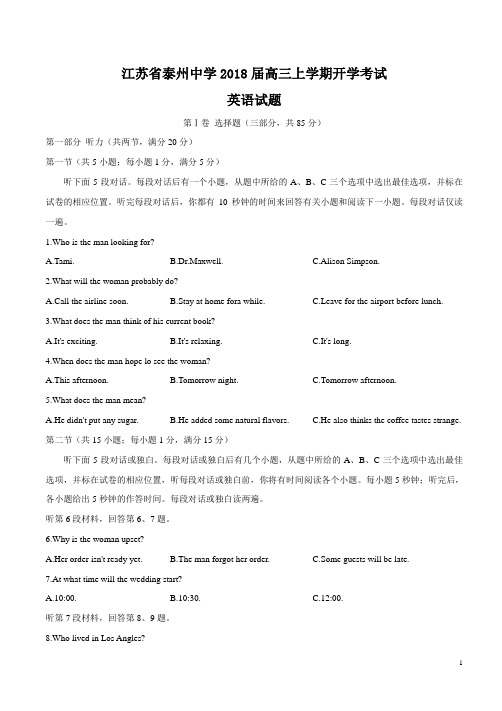
江苏省泰州中学2018届高三上学期开学考试英语试题第Ⅰ卷选择题(三部分,共85分)第一部分听力(共两节,满分20分)第一节(共5小题;每小题1分,满分5分)听下面5段对话。
每段对话后有一个小题,从题中所给的A、B、C三个选项中选出最佳选项,并标在试卷的相应位置。
听完每段对话后,你都有10秒钟的时间来回答有关小题和阅读下一小题。
每段对话仅读一遍。
1.Who is the man looking for?A.Tami.B.Dr.Maxwell.C.Alison Simpson.2.What will the woman probably do?A.Call the airline soon.B.Stay at home fora while.C.Leave for the airport before lunch.3.What does the man think of his current book?A.It's exciting.B.It's relaxing.C.It's long.4.When does the man hope lo see the woman?A.This afternoon.B.Tomorrow night.C.Tomorrow afternoon.5.What does the man mean?A.He didn't put any sugar.B.He added some natural flavors.C.He also thinks the coffee tastes strange. 第二节(共15小题;每小题1分,满分15分)听下面5段对话或独白。
每段对话或独白后有几个小题,从题中所给的A、B、C三个选项中选出最佳选项,并标在试卷的相应位置,听每段对话或独白前,你将有时间阅读各个小题。
每小题5秒钟;听完后,各小题给出5秒钟的作答时间。
2018届江苏省泰州中学高三12月月考英语试题Word版含解析

江苏省泰州中学2018届高三12月月考英语试题本试卷分选择题和非选择题两部分,共120分。
考试用时120分钟。
第1部分听力(共两节,满分20分)第一节(共5小题;每小题1分,满分5分)听下面5段对话。
每段对话后有一个小题,从题中所给的A、B、C三个选项中选出最佳选项,并标在试卷的相应位置。
听完每段对话后,你都有10秒钟的时间来回答有关小题和阅读下一小题。
每段对话仅读一遍。
1. Who was badly hurt?A. A taxi driver.B. A truck driver.C. A passer-by.2. What is the weather like at the moment?A. Rainy.B. Cloudy.C. Sunny.3. Why does the women prefer the brick house?A. The yard is larger.B. It is prettier.C. It is bigger.4. How does the woman suggest the man go to work?A. By bus.B. By car.C. By subway.5. What are the speakers mainly talking about?A. A tour experience.B. A travel plan.C. A happy family.第二节(共15小题,每小题1分,满分15分)听下面5段对话或独白。
每段对话或独白后有几个小题,从题中所给的A、B、C三个选项中选出最佳选项,并标在试卷的相应位置。
听每段对话或独白前,你将有时间阅读各个小题,每小题5秒钟;听完后,各小题将给出5秒钟的作答时间。
每段对话或独白读两遍。
听第6段材料,回答第6、7题。
6. What is the woman doing?A. Offering help.B. Asking the way.C. Making an invitation.7. Where is the bus station?A. On Main Street.B. On First Street.C. On Park Street.听第7段材料,回答第8至10题。
2018届江苏省泰州中学高三12月月考英语试题【含解析】
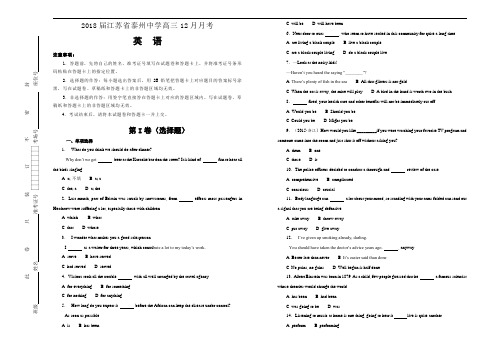
2018届江苏省泰州中学高三12月月考英 语注意事项:1.答题前,先将自己的姓名、准考证号填写在试题卷和答题卡上,并将准考证号条形码粘贴在答题卡上的指定位置。
2.选择题的作答:每小题选出答案后,用2B 铅笔把答题卡上对应题目的答案标号涂黑,写在试题卷、草稿纸和答题卡上的非答题区域均无效。
3.非选择题的作答:用签字笔直接答在答题卡上对应的答题区域内。
写在试题卷、草稿纸和答题卡上的非答题区域均无效。
4.考试结束后,请将本试题卷和答题卡一并上交。
第I 卷(选择题)一、单项选择1.--What do you think we should do after dinner?-- Why don’t we get beer at the Karaoke bar don the street? It is kind of fun to hear allthe birds singing.A. a; 不填B. a; aC. the; aD. a; the2.Last month, part of Britain was struck by snowstorms, from effects most passengers in Heathrow were suffering a lot, especially those with children.A. which.B. whatC. thatD. whose3.--I wonder what makes you a good salesperson.--I as a waiter for three years, which contri bute a lot to my today’s work.A. serveB. have servedC. had servedD. served4.Visitors took all the trouble with all well arranged by the travel agency.A. for everythingB. for somethingC. for nothingD. for anything5.--How long do you expect it before the African can keep the disease under control? --As soon as possible.A. isB. has beenC. will beD. will have been 6.Next door to ours , who seem to have settled in this community for quite a long time. A. are living a black couple B. live a black couple C. are a black couple living D. do a black couple live 7.—Look at the noisy kids! —Haven’t you heard the saying “________”? A. There’s plenty of fish in the sea B. All that glitters is not gold C. When the cat is away, the mice will play D. A bird in the hand is worth two in the bush 8. fired, your health care and other benefits will not be immediately cut off. A. Would you be B. Should you be C. Could you be D. Might you be 9.(2015·浙江)How would you like _________if you were watching your favorite TV program and someone came into the room and just shut it off without asking you? A. them B. one C. those D. it 10.The police officers decided to conduct a thorough and review of the case. A. comprehensive B. complicated C. conscious D. crucial 11.Body language can a lot about your mood, so standing with your arms folded can send out a signal that you are being defensive. A. take away B. throw away C. put away D. give away 12.--I’ve given up smoking already, darling. --You should have taken the doctor’s advice years ago. , anyway. A. Better late than never B. It’s easier said than done C. No pains, no gains D. Well begun is half done 13.Albert Einstein was born in 1879. As a child, few people guessed that he a famous scientist whose theories would change the world. A. has been B. had been C. was going to be D. was 14.Listening to music at home is one thing, going to hear it live is quite another. A. perform B. performing此卷只装订不密封 班级姓名准考证号考场号座位号C. to performD. being performed15.--Why didn’t you invite John to your birthday party?--Well, you know he’s .A. an early birdB. a wet blanketC. a lucky dogD. a green horn二、完形填空Electricity is such a part of our everyday lives and so much taken for granted nowadays ______ we rarely think twice when we switch on the light or turn on the TV set.At night, roads are brightly lit, enabling people and ______ to move freely. Neon lighting used in advertising has become part of the ______ of every modern city.In the home, many ______ devices are powered by electricity. ______ when we turn off the bedside lamp and are ______ asleep, electricity is working for us, ______ our refrigerators, heating our water, or keeping our rooms air-conditioned.Every day, trains, buses and subways take us to and from work. We rarely ______ to consider why or how they run——______ something goes wrong.In the summer of 1959, something ______ go wrong with the power-plant that provided New York with electricity. For a great many hours, life came almost to a ______,Trains refused to move and the people in them sat in the dark, ______ to do anything; lifts stopped working, so that ______ you were lucky enough not to be ___between two floors, you had the unpleasant task of finding your way down ______ of stairs. Famous streets like Broadway and Fifth Avenue in a(n) ______ became as gloomy and uninviting ______ the most remote back streets. People were afraid to leave their houses, ______ although the police had been ordered to ______ in case of emergency, they were just as confused and ______ as anybody else.16.A. that B. thus C. as D. so17.A. car B. truck C. traffic D. pedestrians18.A. appearance B. character C. distinction D. surface19.A. money-saving B. time-saving C. energy-saving D. labor-saving20.A. Only B. Rarely C. Even D. Frequently21.A. fast B. quite C. closely D. quickly22.A. moving B. starting C. repairing D. driving23.A. trouble B. bother C. hesitate D. remember24.A. when B. if C. until D. after25.A. did B. would C. could D. should26.A. pause B. terminal C. breakdown D. standstill27.A. incompetent B. powerless C. hesitant D. helpless28.A. although B. when C. as D. even if29.A. trapped B. placed C. positioned D. locked30.A. steps B. levels C. flights D. floors31.A. time B. instant C. point D. minute32.A. like B. than C. for D. as33.A. for B. and C. but D. or34.A. stand aside B. stand down C. stand by D. stand in35.A. aimless B. helpless C. unfocused D. undecided三、阅读理解AWith the assistance of office volunteers, Doctors Without Borders / Médecins Sans Frontiéres (MSF) can reduce administration expenses and fully apply resources to help more populations worldwide.Office volunteers usually assist us with our clerical work including data entry, letter mailing and information arrangement in MSF-HK office during office hours. You are also welcome to assist us by doing translation, research, designing publications, producing video clips, and other projects according to your schedule at home.We also need volunteers for our events like the MSF Orienteering Competition and our exhibitions to take photographs, and to head reception counters or information booths(咨询台).If you are interested in volunteering for MSF-HK office, please look through our volunteer vacancies below.·Donor Services VolunteerWe are looking for a regular volunteer to help our Donor Services Unit with various data entry work and update the database through making outbound calls to the donors and supporters.·General volunteersApart from specific volunteer vacancies, MSF-HIK also need general volunteers with greater adaptability to assist clerical work or event organization. Should you be interested in joining us as general volunteers, please simply upload your personal information to our volunteer database. Depending on our workload, we will search for volunteers who fit that skill set requirement and time frame, and further contact them for work arrangement.·Join our volunteer databaseThe personal information you provide in the application form will be stored in our volunteer database, and will only be used for the purposes of our voluntary work arrangement and the communication with you. Should there be a suitable match, we will notify you by email or phone. For suggestions or inquiries about our voluntary services, please feel free to contact us. (Tel: 2959 4229; Email: volunteer@) 36.According to the passage, office volunteers for MSF-HK .A. usually needn’t work overtimeB. should master at least two languagesC. are required to complete their task in the officeD. may have received a handwritten letter of appointment37.MSF-HK’s job arrangement for office volunteers is .A. permanentB. vagueC. flexibleD. privateBAfter a fight and before forgiveness often comes an apology. But saying “I'm sorry” comes more easily for some people than it does for others. Character is vital in creating a sincere apology. Those who lack character are not up to the task. They may try to give apologies that sound genuine. They may even use fancy words, but a real apology demands character. A new study suggests that specific personality traits offer clues about whether a person is likely to offer a sincere apology.Psychologist Andrew Howell and his colleagues at Grant MacEwan University in Edmonton devised a questionnaire to measure a per son’s willingness to beg someone’s pardon. They asked participants to indicate their level of agreement with a series of statements, such as “My continued anger often gets in the way of me apologizing” or “If I think no one will know what I have done, I am not likely to apologize.” The researchers then used the answers to determine every participant’s “proclivity(倾向))to apologize,” and they cross-referenced these scores with results from a variety of personality assessments.From the beginning, Howell was confident that people with high marks for compassion and agreeability would be willing apologizers-and the study results confirmed his hypothesis(假设). But the experiment also turned up some surprising traits of the unrepentant(不思悔改的).People with low self-esteem, for example, are less inclined to apologize, even though they probably feel bad after a conflict. Unlike people who experience guilt about a specific action and feel sorry for the person they have wronged, individuals who experience generalized shame may actually be feeling sorry for themselves.In contrast, “people who are sure of themselves have the capa city to confess to wrongdoing and address it,” Howell suggests. But just the right amount of self-esteem is key. The study also found that narcissists-people who, in Howell’s words, “are very egocentric, with an overly grand view of themselves”—were reluctant to offer an apology.The researchers were most surprised to find that a strong sense of justice was negatively correlated with a willingness to apologize, perhaps suggesting that contrition(忏悔)and “an eye for an eye” philosophy are incompatible(不能并存的), Reconciliation(和解)may end a conflict, but it cannot always settle a score.38.What kind of people are more likely to apologize?A. Intelligent people.B. Confident people.C. People valuing fairness.D. People feeling sorry for themselves.39.The underlined sentence in the last paragraph suggests .A. an end of conflict doesn’t mean wrongdoers have been punishedB. “an eye for an eye” philosophy cannot solve an argumentC. only by deep regret can one learn the lesson of his wrongdoingsD. unsatisfactory compromises cannot end a conflict peacefully40.The study done by Andrew Howell and his colleagues reveals .A. what influences one to be a willing apologizerB. when people might apologize willinglyC. what a willing apologizer is all aboutD. how to become a willing apologizerCIt’s no surpr ise that Sony Corp. will finally stop producing Betamax videocassettes. Betamax transformed the world’s viewing habits 40 years ago but it was quickly beaten by another format, VHS. No new Betacam recorders have been available, even in Japan, for over 13 years. So why did the format last so long? It’s easy to blame corporate stubbornness. But the persistence of obsolescent(逐步废弃的)technologies goes beyond culture. It takes three forms:The first is pragmatic(实用主义的). Many people, including owners of the latest devices, retain some old ones because they want to avoid some of the vulnerabilities of new equipment. Consider the often-ridiculed fax machine: A scanned document may be more convenient and cheaper to send than a fax, for example, but unencrypted(未加密的)personal information is obviously easy to hack online. Another pragmatic reason for using older devices is simply that they still work. Professional laboratory instruments and theatrical lighting systems with years of useful life ahead of them still operate with floppy disks, forexample. And world’s military leaders, for all their fascination with advanced weapons, find it hard to part with older tough ones. The military historian David Edgerton, in his book The Shock of the Old: Technology and Global History Since 1900, argues that Hitler would have done better to build 24,000 fighter aircraft for the cost of his “wonder weapon” V-2 rocket program, and that the U.S. could have defeated Japan earlier if Manhattan Project funds had been used for more conventionally armed B-29s.A second reason for using older technology is aesthetic(有关美学的). Where pragmatic users like saving money, aesthetic ones will gladly pay more for what they consider a higher quality or more authentic experience. Not too long ago, vinyl records(黑胶唱片)were associated with middle-aged purists; now they appeal to the younger generation as well. Sometimes, pragmatic choices change into aesthetic ones. Modern automatic transmissions offerbetter fuel economy than the few remaining U.S. stick shift models, and are now standard equipment on American-built cars. Yet remaining devotees still desire manual transmissions for the tactile(触觉的)experience of driving them.Paradoxically, the web and social media have also helped prolong the lives of old technologies, especially on aesthetic grounds. The page “Driving a Stick Shift” has over 10,000 Likes on Facebook. Amazon, eBay and modern search engines make it easy to find niche products in the US.The third conservative style might be called rescue technology. Many essential records and elements of audiovisual production have not been and won’t be digitized. Whereas the last American compan y to sell IBM card-reading machines, Cardamation Co., went out of business in 2012 after its owner’s death, the California Tab Card Co. still sells punch(打孔)cards. And at least one successful family-owned technology business, Sparkler Chemical Filters of Texas, still punches its business records. Public libraries have long abandoned exclusive use of card catalogues, and the last company preparing new cards discontinued them in October 2015, but there are still countless historic public and private records in file card format that must be preserved, and damaged cards replaced.Whatever the motive, saving old formats is a green reply to planned obsolescence and the electronic waste threat. So let’s toast, not mock, the Japanese Betamax fans who stayed loyal to the end.41.It can be inferred from the first paragraph that .A. Betamax has less effect on people’s viewing habits than VHSB. Betamax videocassettes have been unavailable for many yearsC. the persistence of Betamax is bound to result from corporate stubbornnessD. Betacam recorders have been dropped long before Betamax videocassettes are shelved42.The underlined word “vulnerabilities” probably means .A. lack of what is needed or necessaryB. feelings that something can be misusedC. unclearness by virtue of being poorly expressedD. possibilities of being exposed to something undesirable43.David Edgerton’s book is mentioned to highlight .A. the great power of advanced new weaponsB. the shortcomings of obsolescent technologiesC. the effectiveness of old equipmentD. the high cost of building new devices44.What can we learn from Paragraphs 3&4?A. Aesthetic users tend to prioritize experiences over prices.B. Pragmatic users are usually not so wealthy aesthetic users.C. Devotees of manual transmissions are attracted by their pragmatic value.D. Youthful music lovers spend more money on records than middle-aged purists.45.The author’s attitude towards those who stick with outdated technology is one ofA. appreciationB. disappointmentC. sympathyD. skepticismDAre we trapped in the present, free to move in space yet unable to travel in the fourth dimension(次元)? Or is there a chance or a glimmer of a possibility that the past and future could unfurl(展开)to our physical experience at will? James Gleick’s latest offering Time Travel: A History sets out to question the questions, exploring how the idea of time travel emerged, held our imaginations and shaped our society.From the start it is apparent who the hero of this journey is. “On e way or another, the inventions of Mr.H.G. Wells colour every time-travel story that followed,” writes Gleick, pointing out that while a small number of earlier stories explored utopian(鸟托邦的)futures, it was him who, with his 1895 work, got to the practical details of the mater in knocking up a time machine.It’s easy to forget that time travel is a relatively recent idea. As Gleick points out, for most of human history, change was incremental-yesterday looked much like today, today much like tomorrow. “Before futurism could be born, people had to believe in progress,” he writes. The development of technology, resulting in the industrial revolution, made that possible. With a great many changes, the future, and what it might look like, became a subject for meditation. And as archaeology developed, writers like E Nesbit began flights of fancy to the past, too.Embraced by novelists, wrestled with by philosophers and informed by science—not least Hermann Minkowski’s revelation, following Einstein’s breakthrough, of four-dimensional space-time-the possibility that the arrow of time could be tinker(走街串巷的小炉匠)became a meme(口头禅). From fiction writers such as Robert Heinlein, to F Scott Fitzgerald and his The Curious Case of Benjamin Button, from Terminator to Dr Who, events in the future which are affected by imaginary developments in science blossomed the literary world.As Gleick reveals, problems and paradoxes(看似矛盾而可能正确的说法)were immediately put forward. Is our future governed by fate, or free will? Does time travel always mean ending up naked, with your clothes left in the present? “All the paradoxes are time loops(循环). They all force us to think about causality, the relationship of cause and effec t.”Among those doing the thinking are philosophers and scientists. Attempting to tackle the idea that wormholes-tunnels in space-time-could be turned into time machines allowing journeys into the past, even Stephen Hawking has entered the heated discussion, concluding that the laws of physics are against it.Gleick navigates the twists and turns of our fascination with time travel, investigating its evolution in literature, exploring scientific principles that have hinted at or contradicted the idea, and teasing the curious spell it has cast across society with its suggestion of immortality(永生).But, as he notes, not every product of this obsession with time was hard to understand. “The time capsule(时间胶囊)is a characteristically 20th-century invention: a tragicomic time machine. It lacks an engine, goes nowhere, sits and waits,” he writes, surveying various attempts to send snapshots(快照)of civilisation into the future. Indeed, it’s hard to know whether disappointment, amusement or simply confusion will be the dominant emotion when the Crypt of Civilisation time capsule at Oglethorpe in Atlanta is opened in 8113 AD. Created in 1936, its contents include voice recordings of historical figures.Not every idea of time travel is rooted in the physical, and Gleick explores how in the act of storytelling we mess with chronology(年代表). “We don’t have enough tenses. Or rather, we don’t have enough names for all the tenses we create,” he writes of the complexity unleashed in literature by the concept. Readers, too, become time travellers, able to move at will backwards and forwards through a story. More than that, Gleick argues, books cannot be separated from time. Even if you know a book well -even if you can recite it, like the Homeric(荷马史诗的)poet一you cannot experience it as a timeless object.46.What’s the author’s purpose in askin g the two questions in the first paragraph?A. To arouse readers’ interest in reading the passage.B. To introduce the latest book by James Gleick.C. To stress the significance of scientific development.D. To encourage readers to explore the possibility of time travel.47.The underlined word “incremental” in Paragraph 3 is closest in meaning to “”.A. gradualB. impossibleC. unwelcomeD. abrupt48.Which of the following is unlikely to be science fiction?A. Dr Who.B. Terminator.C. Time Travel: A History.D. The Curious Case of Benjamin Button.49.What can we learn from the passage?A. People who return from time travel are often described as naked.B. Philosophers have firmly believed in the possibility of time travel.C. Stephen Hawking denies that wormholes can be tunnels for time travel.D. James Gleick thinks time travel can guarantee the everlastingness of one’s life.50.We can infer from the last two paragraphs that .A. the voice recordings stored in Crypt of Civilisation may become unclear in 8113B. exploring a book's historical background can help better understand its contentsC. authors of sci-fi novels should draw a clear time line by adopting proper tensesD. James Gleick advises people to distinguish reality from imagination第II卷(非选择题)四、任务型阅读Factory farming is a type of farming that involves raising a huge number of livestock(牲畜)in comparatively tinier enclosed spaces, with a view to supplying them to the livestock market. It took root in the later part of the 19th century. On the arrival of the Industrial Revolution, the inventions of antibiotics and pesticides were increasing in number, which made it possible to practice factory farming. And gradually, with better farming methods, livestock were able to be raised indoors leading to mass production in a shorter while. Nowadays, according to reliable sources, more than 50% of the livestock are produced using this concept.Factory farming is one of the most important food production methods around the world today because it has a lot of advantages. For example, there are huge numbers of mouths to feed, and mass production leads to the purchase of poultry and the related items. Since the items aren’t priced too high for consumers to afford, people appreciate buying them in a large number. And as more and more livestock are artificially raised, more and more chicken, beef and eggs are out for sale. The purchase rate is higher and despite being reasonably priced, the produce fetches a profit for the farms. In addition, since the business is enormous andnot be as good as usual. The products thus obtained are of such low quality, which ultimately affects our health as well. Actually, since the entire production is artificial, the meat is overloaded with hormones (激素)and drugs, and the bacteria develop resistance to the antibiotics, which is why many diseases remain untreated. Worse still, the animals’ waste can pollute the water and air, causing extensive damage to the environment. It may also lead to harmful emissions and contribute to the already increasing global warming.Because of the above advantages and disadvantages of factory farming, the concept has been a subject of massive debate all over the world, wherever this practice has been employed. Supporters of this concept argue that it does provide enough food for the increasing population and is more affordable. However, unfavorable opinions suggest that there are better ways of producing food, rather than subjecting animals to this suffering. The debate has been going on for quite a while, with no one being able to gain the upper hand.五、图表作文 61.请阅读下面短文,并按照要求用英语写一篇150词左右的文章。
江苏省泰州中学2022届高三上学期开学考试英语试题 Word版含答案

第Ⅰ卷选择题(三部分,共85分)第一部分听力(共两节,满分20分)第一节(共5小题;每小题1分,满分5分)听下面5段对话。
每段对话后有一个小题,从题中所给的A、B、C三个选项中选出最佳选项,并标在试卷的相应位置。
听完每段对话后,你都有10秒钟的时间来回答有关小题和阅读下一小题。
每段对话仅读一遍。
1.Who is the man looking for?A.Tami.B.Dr.Maxwell.C.Alison Simpson.2.What will the woman probably do?A.Call the airline soon.B.Stay at home fora while.C.Leave for the airport before lunch.3.What does the man think of his current book?A.It's exciting.B.It's relaxing.C.It's long.4.When does the man hope lo see the woman?A.This afternoon.B.Tomorrow night.C.Tomorrow afternoon.5.What does the man mean?A.He didn't put any sugar.B.He added some natural flavors.C.He also thinks the coffee tastes strange. 其次节(共15小题;每小题1分,满分15分)听下面5段对话或独白。
每段对话或独白后有几个小题,从题中所给的A、B、C三个选项中选出最佳选项,并标在试卷的相应位置,听每段对话或独白前,你将有时间阅读各个小题。
每小题5秒钟;听完后,各小题给出5秒钟的作答时间。
每段对话或独白读两遍。
听第6段材料,回答第6、7题。
- 1、下载文档前请自行甄别文档内容的完整性,平台不提供额外的编辑、内容补充、找答案等附加服务。
- 2、"仅部分预览"的文档,不可在线预览部分如存在完整性等问题,可反馈申请退款(可完整预览的文档不适用该条件!)。
- 3、如文档侵犯您的权益,请联系客服反馈,我们会尽快为您处理(人工客服工作时间:9:00-18:30)。
第Ⅰ卷选择题(三部分,共85分)第一部分听力(共两节,满分20分)第一节(共5小题;每小题1分,满分5分)听下面5段对话。
每段对话后有一个小题,从题中所给的A、B、C三个选项中选出最佳选项,并标在试卷的相应位置。
听完每段对话后,你都有10秒钟的时间来回答有关小题和阅读下一小题。
每段对话仅读一遍。
1.Who is the man looking for?A.Tami.B.Dr.Maxwell.C.Alison Simpson.2.What will the woman probably do?A.Call the airline soon.B.Stay at home fora while.C.Leave for the airport before lunch.3.What does the man think of his current book?A.It's exciting.B.It's relaxing.C.It's long.4.When does the man hope lo see the woman?A.This afternoon.B.Tomorrow night.C.Tomorrow afternoon.5.What does the man mean?A.He didn't put any sugar.B.He added some natural flavors.C.He also thinks the coffee tastes strange.第二节(共15小题;每小题1分,满分15分)听下面5段对话或独白。
每段对话或独白后有几个小题,从题中所给的A、B、C三个选项中选出最佳选项,并标在试卷的相应位置,听每段对话或独白前,你将有时间阅读各个小题。
每小题5秒钟;听完后,各小题给出5秒钟的作答时间。
每段对话或独白读两遍。
听第6段材料,回答第6、7题。
6.Why is the woman upset?A.Her order isn't ready yet.B.The man forgot her order.C.Some guests will be late.7.At what time will the wedding start?A.10:00.B.10:30.C.12:00.听第7段材料,回答第8、9题。
8.Who lived in Los Angles?A.The woman's aunt and uncle.B.The man's grandparents.C.The woman's parents.9.What will the speakers do next?A.Have a picnic.B.Go hiking.C.Try to catch some fish.听第8段材料,回答第10至12题。
10.What did the man study in college?A.Art history.B.Medicine.C.Business.11.How do the speakers know each other?A.They are neighbours.B.They are salesman and customer.C.They are teacher and student.12.What is the man's advice for the woman?A.Doing what her father suggests.B.Exploring all the possibilities.C.Making a decision as early as possible.听第9段材料,回答第13至16题。
13.How does the woman want to pay?A.In cash.B.By credit card.C.With her smartphone.14.What does the man think of PayPal?A.It is free.B.It is popular.C.It isn't very fast.15.Where is Venmo accepted?A.At many small shops.B.At most large stores.C.At a lot of restaurants.16.What does the woman offer to do for the man?A.Download the app.B.Send him an invitation.C.Lend him some money.听第10段材料,回答第17至20题。
17.What is the weather probably like?A.Hot.B.Dry.C.Rainy.18.Where did Matt begin his journey?A.In England.B.In California.C.In Hawaii.19.How many hours was Matt's longest flight?A.Fourteen hours.B.Sixteen hours.C.Sixteen and a half hours.20.What will Matt do next?A.Interview someone.B.Share his experiences.C.Plan on another journey.第二部分英语知识运用(共两节,满分35分)第一节单项填空(共15小题;每小题1分,满分15分)从A、B、C、D四个选项中,选出可以填入空白处的最佳选项,并在答题卡上将该项涂黑。
21. —Would you mind giving some advice on how to improve our study?—If you make______most of the time,there will be______rise in your study efficiency.A./; /B.the; aC./; aD.the; /22.It was in this very town,____Tom was born thirty years ago,____he will build a new school,____excites everyone in the town.A.that; that; whichB.where; that; whichC.where; when; thatD.that; where; that23.The most exciting thing for him was____he finally succeeded in____seemed to be the most difficult exam to him.A.that; whatB.that; whichC.what; thatD.what; which24.There,______Mrs Smith,showing her pupils how to put a logo onto the new torch.A.standing on the platform wasB.was standing on a platformC.on a platform was standingD.was on a platform standing25.There are some factors dominating your success.______a good chance sometimes,in my opinion,outweighs one's ability.A.CatchingB.Having seizedC.SeizingD.To catch26.There're so man______terms in the article that few people can read it.A.sacredB.professionalC.preciousD.broad27.Located_____the eastern coast of the sea,the village is fairly new____only a small population of less than 3000.A.on; withB.off; withC.in; ofD.on; in28.Believe it or not,the young man,______disabled,managed to______a distance of 500 miles within 30 minutes.A.as if; walkB.though; runC.even; coverD.though; cover29.However busy you are,try to______at least half an hour each day to practice listening and reading.A.put awayB.put upC.put ofD.put aside30.They agreed to let me______for a week to see if I was up to the job I had applied for.A.try outB.look outC.burst outD.hold out31.What I'm going to say may offend some sensitive listeners at the meeting,______I offer my apologies in advance.A.from whomB.for whomC.to whomD.with whom32.It was not until I returned to China this winter after living so long abroad _I began to experience safety and happiness.A.whereB.beforeC.thatD.so33.The doors of this palace are really______,all made of good valuable wood.A.everythingB.somethingC.anythingD.nothing34.Lisa has had to stop doing all the gardening recently,______her back problem.A.on account ofB.in response toC.with regard toD.by means of35. —Many thanks for your support.—______.I am more than willing to offer help if I'm needed next time.A.It's my privilege.B.That's always the case.C.You can say that again.D.That rings a bell. 第二节完形填空(共20小题;每小题1分,满分20分)阅读下面短文,掌握其大意,从每题所给的A、B、C、D四个选项中,选出最佳选项,并在答题卡上将该项涂黑。
